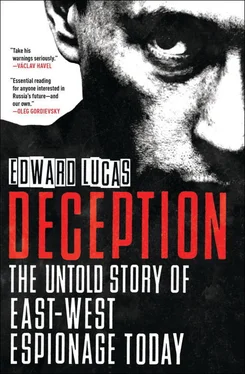The source of the allegations was José Grinda González, nicknamed ‘Pepe’, a senior Spanish prosecutor who has spent a decade investigating the Russian mafia. His record in fighting Russian organised crime leaves other European countries looking feeble and ineffective. He was responsible for the investigation of Zakhar Kalashov, the most senior ‘Russian mafia’ figure (he has Georgian nationality) to be jailed in Europe. Mr González was involved in two big anti-mafia operations in recent years, ‘Avispa’ (2005–07) and ‘Troika’ (2008–09), which resulted in the arrest of more than sixty suspects.
In January 2010 Mr González gave a frank briefing to a US–Spanish working group. He not only described Russia and Belarus as ‘mafia states’ where ‘one cannot differentiate between the activities of the government and OC [organised crime] groups.’ [19] s He also put Georgia in this category and said that Ukraine was heading there.
He also endorsed the sensational claims made by Aleksandr Litvinenko, a Russian political exile poisoned by a polonium isotope in London in 2009. (Mr Litvinenko, a former FSB officer, claimed in two books, both banned in Russia, that the former KGB was involved in assassinations and drug smuggling, and staged terrorist outrages for political purposes.)
Among other insights, Mr González said the Liberal Democratic Party of Russia was created by the intelligence services and was closely tied to the mafia (run by the clownish Vladimir Zhirinovsky, it adopts extreme political positions but its deputies in the Duma dependably vote the Kremlin line). The FSB, he said, had the upper hand in the state’s symbiotic relationship with criminality. Crime bosses who do not toe the line risk being killed or jailed. Perhaps most worryingly of all, he appeared pessimistic about the Spanish state’s ability to deal with the Russian mafia. Attempts to ‘decapitate it’ had failed, he said. And its senior bosses were fighting back, with a ‘systematic campaign’ to manipulate the Spanish legal system.
Mr González’s views are striking, but they are not extreme. Other officials say much the same thing in unattributable briefings. What is unusual is that, thanks to WikiLeaks, the wider public is able to read the unvarnished and attributable views of a senior, expert official, speaking frankly. Occasional on-the-record assessments from senior security officials say much the same thing in more guarded language. 5The really puzzling thing is why this does not resonate into the public debate. Faced with a gangster-run state on our doorstep, why do not our politicians take the necessary steps to quarantine it and counter its malign effects? One reason is clearly the ‘war on terror’, which has diverted attention and effort to deal with the threat from radical Islam. Even in the narrow world of counter-intelligence, Chinese spies seem to attract more attention than Russian ones. Admittedly, Beijing’s agencies have formidable hackers and are good at stealing military and technological secrets. But they do not murder people, rig our decision-making, or disrupt our alliances. Russia’s spies are part of a much wider picture: an effort to play divide and rule, to exploit the greed of Western politicians and officials by paying them to make Kremlin-friendly decisions, and to deal ruthlessly with dissent abroad. This last element leads to flagrant law-breaking by Russian spies, which brings surprisingly little comeback.
One example is the Litvinenko case, mentioned above. His killing, in the view of British officials, involved the FSB. I dealt with this at length in The New Cold War . 6A second instance is portrayed in a book by two British investigative journalists, Mark Hollingsworth and Stewart Lansley, dealing with what looks like the assassination of Stephen Curtis, a 45-year-old lawyer for Mr Khodorkovsky. 7Mr Curtis had helped mastermind the shift of Yukos from a shambolic collection of assets marked by rows with investors into a $15bn oil and gas company. Some called that evolution merely cosmetic; others believed it signalled the end of robber-baron tactics and the adoption of good management and transparent corporate governance. Mr Curtis was also a legal adviser to Mr Berezovsky and to other senior Russian figures.
Mr Curtis dealt with frightening people. But he was not easily frightened. When a friend warned him, ‘You are dealing with the Devil,’ he replied: ‘I will jump on their backs and ride all the way down to hell.’ That proved unpleasantly prescient. After Mr Khodorkovsky was arrested in 2003, Mr Curtis was – all but literally – in the firing line, as the man who knew the intimate details of his finances. He feared prosecution in Russia on the same trumped-up charges – tax avoidance, money-laundering and embezzlement – and a contract killing at the behest of Mr Khodorkovsky’s emboldened business rivals. In the weeks before his death he was under surveillance from investigators hired by minority shareholders in Yukos and by people apparently working for the Russian state. His security consultants found evidence of bugging at his castle in Dorset. He hired a bodyguard and in mid February 2004, worried by escalating death threats, offered (friends say) the British authorities information in return for government protection. A week before his death he told a friend: ‘If anything happens to me in the next few weeks, it will not be an accident.’ On 3 March 2004 his helicopter was approaching an airfield in Dorset in poor but not dangerous weather when it suddenly lost power and crashed into a field. An official investigation said that the pilot, Max Radford, had become disorientated during the final stages of his approach to the airfield and found no evidence of an explosion (though tampering with the controls would have also brought the aircraft down). 8Mr Curtis’s former bodyguard Nigel Brown, a former Scotland Yard detective, believes his client was killed and is puzzled that the police did not launch a murder inquiry.
It is not just lawyers for fugitive oligarchs who have reason to be worried. A remarkable BBC radio programme in the summer of 2010 entitled ‘Why Russia Spies’ 9gave a tantalising glimpse into the closely guarded world of British security and defence worries. It was perhaps a sign of private concern in Whitehall about Russian activities that the radio producers were allowed the access that made the programme possible. Its opening sequence sounded like a flashback to the Battle of Britain: listeners heard fighter pilots scrambling to intercept potentially hostile aircraft. These Russian antics mostly involve the lumbering ‘Bear’ (Tupolev Tu-95) bomber, a propeller-driven hulk that first went into service in 1952. It is a useful platform for launching nuclear missiles, but it is easily spotted and no match for any NATO air force. Sometimes, however, the Russian sorties involve the ‘Blackjack’ (Tupolev Tu-160), a sleek supersonic machine with advanced radar-dodging technology that still creates headaches for NATO. In 2008 news leaked of an incident the previous year when a Blackjack approached northern England at a speed and height that mimicked a real nuclear attack. The target was somewhere between Leeds and Hull. Though the Russian plane turned back just before actually entering British airspace, for a few nerve-wracking seconds defence commanders wondered if World War Three might just possibly be imminent. 10
The real damage was to British credibility, not nerves: the overstretched RAF was short of planes to meet the potential intruder. (That was in 2007: its ability to defend British airspace was weaker at the time of writing and is set to be eroded still further by defence cuts.) The frequency of such probes is surprising – as often as one a week in some periods, and more than fifty since 2005. It is not just Britain that suffers these unwelcome attentions. In 2011, Russian bombers intruded on Dutch airspace on at least three occasions. 11Though irked and sometimes alarmed, defence chiefs dislike discussing the subject. They say that in a real war few Russian planes would get airborne and all would be shot down long before they were near NATO air space. In peacetime, they do not want to give Russia the satisfaction of knowing that its sabre-rattling has an effect.
Читать дальше












